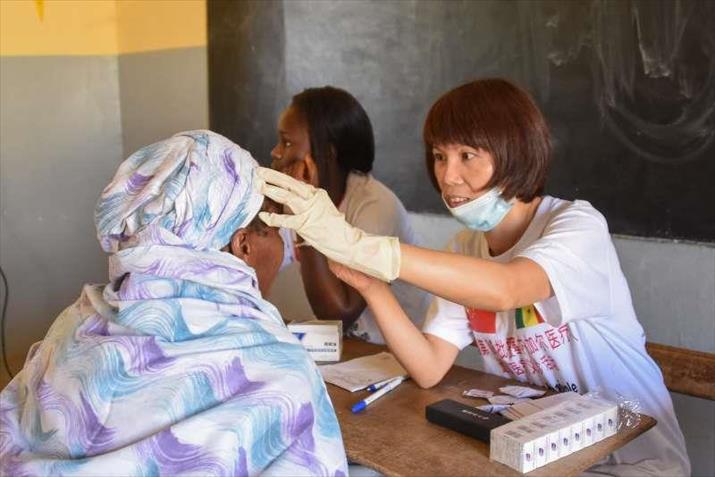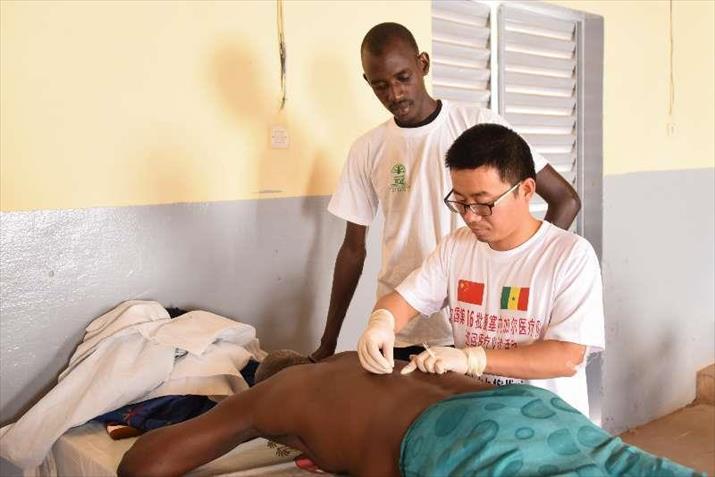|
||||||||||
| Home Nation World Business Opinion Lifestyle ChinAfrica Multimedia Columnists Documents Special Reports |
|
||||||||||
| Home Nation World Business Opinion Lifestyle ChinAfrica Multimedia Columnists Documents Special Reports |
| China |
| The Lion Within |
| Courageous Chinese medical team overcomes difficulties and makes a difference in Senegal |
| By Ge Lijun ·2017-01-03 |

Dr. Zhang Maoshi often jokes that he was predestined to come to Africa since birth. His given name - Maoshi - literally contains the Chinese character for "lion." In what appears to be a matter of fate, the 53-year-old doctor is now working in Senegal, home of the Senegalese lion.
"It is surely destiny that drove me to come to Africa," said Zhang, with tongue in cheek.
The African continent - previously a faraway and mysterious land which he knew for its wildlife - has now become part of Zhang's life since he set foot in Senegal as part of a Chinese medical team.
Zhang left his hometown of Zhangzhou, in southeast China's Fujian Province, on September 1, 2015, along with 11 doctors and an interpreter, for Senegal, where they will work for a period of two years as part of the 16th medical team to Senegal of the Fujian Provincial Health and Family Planning Commission.
Shortly after their arrival, the team settled near the Pikine National Hospital Center, in the Senegalese capital Dakar, and soon got to work alongside their local colleagues. Zhang, an experienced researcher and chief physician specializing in Chinese medicine, has been chosen to head the team.
"We were dispatched in different sections of the hospital, and we started treating patients," Wang Yuanquan, the team's surgeon, told ChinAfrica. "I know our task is difficult in this distant and foreign country, but I really want to do everything possible to help treat Senegalese patients."
With a "Chinese lion" as their head, the team members felt invigorated, despite being apprehensive about the coming challenges of working under difficult conditions far from their home.
Voluntary consultations
In addition to their daily work at the Pikine hospital, the Chinese team often organizes medical consultations around the country to treat patients, distribute medicines and raise awareness on the prevention of contagious diseases, all free of charge.
"At eight o'clock in the morning, local people were already standing in line waiting for us; they smiled as we arrived and welcomed us. After a short preparation, consultation began," said team head Zhang, recalling a recent voluntary consultation conducted on February 27, 2016, in Dakar's Yoff District.
Local medical staff help the team categorize patients, who are then seen and treated by Chinese specialist doctors.
"Medical care is a major concern for our local population. The voluntary consultations provided by the Chinese medical team meet very well the urgent demands of the local residents," said Abdoulaye Diouf Sarr, Minister of Local Governance, Development and Territory Management of Senegal, while inspecting the team's activities.
According to the Fujian Health and Family Planning Commission, starting from 1975, the province has sent a total of 258 medical experts to Senegal.
"The officials on the Senegalese side tell us that the local communities put a lot of hope in us, and that they have been waiting for us for a long time," said Zhang, adding that the number of people who sought consultations on that day was much more than they expected. In order to treat everyone, some team members even gave up their lunch time.
So far, the Chinese team has conducted six similar voluntary consultation activities, each time helping more than 300 people, both in the capital Dakar and in other cities such as Thiès.
"When we conduct this kind of voluntary activities, we often encounter people with all kinds of diseases and we are at risk of being infected. One time, we arrived in a village where there were several cases of leprosy; that really gave us a good scare! Leprosy is a terrible disease, but we treated all patients despite the risk of contamination," said Yan Shanghai, a 35-year-old acupuncturist, with a glimmer of pride in his eyes.
Spirit of dedication
As their mission progresses, life away from home is increasingly weighing on the Chinese doctors. Even though their work at the hospital and in voluntary consultations give them a sense of satisfaction, the harsh reality of being away from their children and family members is painful.
The team's youngest member was born in 1992, and the oldest in 1962, with most members between 33 and 45 years old.

"Last year my son was about to enter college, but I could not be with him. So I asked my husband to support him. Despite this, I still want to do good for the people here. Don't they say that doctors do not know borders?" said Zhang Wenwen, a 44-year-old expert oculist, one of the three women on the team.
Team head Zhang often talks with his fellow team members about their anxieties. He even arranged a fitness room for them to let off some steam. "I see with my own eyes that it is not easy for them to be here, but they are doing very important things. So I'm doing everything I can to create a good living environment and keep them safe while they are here," said Zhang.
These efforts seem to have borne fruit and the team has grown closer than ever.
"We are like a big family. Zhang [Maoshi] is like the head of the family, and the interpreter Wei Jiajia is like our youngest sister. Some of us are in charge of growing vegetables, and I cut hair for our team members," said Zhang Songtu, a 43-year-old osteopractitioner. Part of the team is also a chef from Fujian, who tries to reproduce in Senegal the delighting tastes of their home province.
Language barrier
If their spirit of dedication supports them in dealing with homesickness, language has proven to be a tougher nut to crack.
"Before we came to Senegal, we were trained for eight months in the French language, but it is difficult to learn it at our age. Moreover, when you arrive here, you find that most local people speak Wolof, a local language that you do not understand," said Fang Mingda, a 41-year-old otolaryngologist.
Because overcoming the language barrier is so difficult, Yan communicates with his patients through gestures and by paying attention to the expressions on their face to identify exactly the source of their pain.
"Lack of communication hinders accurate treatment. But I always try to do my best to treat them and my French is slowly improving, which helps communication to some extent," he told ChinAfrica.
While their Chinese interpreter is of great help with the French language, the team has had a hard time dealing with Wolof-only speakers.
"Now there are about 100 medical sites in more than 40 African countries, and I think this problem is common," said team head Zhang.
Fortunately, such concerns will be alleviated gradually in the future with the help of young Chinese talent. Beijing Foreign Studies University plans to add five African languages to its curriculum in the next five years - Amharic, Somali, Malagasy, Zulu and Yoruba. Although these languages will cover only a limited scope of Africa's linguistic diversity, it is a step in the right direction.
Zhang Maoshi and his teammates will complete their medical mission to Senegal in September 2017, after which another team will take over and build on what they have achieved. "Despite all the difficulties, we are helping the Senegalese population with our limited medical capacity, and it is absolutely worth it," he said.
| About Us | Contact Us | Advertise with Us | Subscribe |
| Copyright Beijing Review All rights reserved 京ICP备08005356号-5 京公网安备110102005860号 |